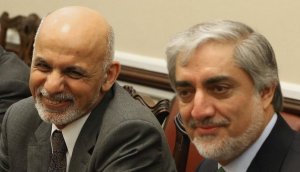Taliban Poised to Exploit Afghanistan’s Political Nightmare, Thanks to U.S.

Ghani (left) and Abdulllah (right) – File photo
Michael Hughes
March 16, 2020
Legitimacy has long been king in Afghanistan. Without political legitimacy, there is chaos. This may be true in most countries but, as per history, the correlation in Afghanistan is stronger than in most. Hence, it is no accident that Afghanistan has been mired in civil war since the delicate ethno-sectarian-tribal balance was disrupted in the 1970s.
On March 9, the de facto divide in Kabul became literal when Abdullah Abdullah proclaimed himself president of Afghanistan alongside the technically-elected Ashraf Ghani.
Meanwhile, the Taliban has established shadow governance over almost half the country, which was much more straightforward in realizing because it did not require the casting and counting of ballots.
To be sure, the vote fraud that has plagued every Afghan presidential contest in the post-9/11 era makes it difficult to consider with high confidence any declared winner “legitimate” in the fullest sense of the term.
That said, although based on justified qualms, Abdullah’s move to override the official results could not have come at a worst moment as the Taliban, an insurgent group legitimized by the Trump administration, is prepared to seize power through force and/or possibly an undemocratic Faustian bargain.
Let us be clear: the U.S. laid the conditions for this disaster on February 29 when it struck a phony peace deal with the Taliban – the terms of which implicitly put pressure on the Afghan government to strike a power-sharing arrangement with unelected insurgent leaders.
Kabul, for its part, has been leery, with good reason, to implement said terms including a release of some 1,500 Taliban captives.
Although U.S. officials have condemned efforts to establish a parallel government, their words ring hollow because the Trump administration has helped set in motion a process for illegitimately modifying the makeup of the newly-elected government.
Washington’s decision to ignore the outcome of the vote no doubt helped motivate Abdullah to do the same.
The State Department, rather than explicitly recognizing Ghani as the duly-elected leader of the country, chose to further sow the seeds of discontent, division and confusion by simply “noting” that the Independent Election Commission’s announcement happened.
The U.S. also stressed the fact that “concerns have been raised about the election process,” thereby stirring doubts over the sanctity of the final tally.
Moreover, Washington urged Kabul to prioritize formation of an “inclusive” post-settlement regime over pesky political infighting and dared to underscore it expected talks to begin this month.
“It is time to focus not on electoral politics, but on taking steps toward a lasting peace, ending the war with the Taliban, and finding a formula for a political settlement,” State Department spokesperson Morgan Ortagus said in a statement on February 25.
Can we interpret the word “formula” in this context to denote anything other than the Faustian deal alluded to? To be blunt, the United States, that bastion of democracy, in one fell swoop cast doubt on Ghani’s legitimacy and paved the way for a suprademocratic regime.
Making matters even worse, many fear violence could erupt between the camps of Ghani and Abdullah – a development that would only strengthen Taliban leverage.
“All the cards are in the Taliban’s hands now,” former Afghan national security adviser Zalmai Rassoul told The Washington Post. “If there is no breakthrough within the next week to 10 days, something could happen that makes things spin out of control.”
From the most unlikeliest of sources sometimes wisdom springs, as evidenced by former Afghan president Hamid Karzai’s recent condemnation of the U.S. role in fueling the current legitimacy crisis. Karzai, it is important to note, was illegitimately-crowned president of Afghanistan’s first post-Taliban government as the result of a CIA-stage-managed Loya Jirga.
Even more ironic is the fact that Karzai owes his coronation to the man currently heading U.S. policy in Afghanistan, State Department envoy Zalmay Khalilzad.
A day after the dueling inauguration festivities Karzai characterized Washington’s approach as “insulting” and “divisive.” The Trump administration, Karzai argued, could have prevented disunity and political instability by taking more constructive actions before the oath-taking ceremony.
“In all my meetings with U.S. officials in recent months, especially with U.S. special envoy [Khalilzad], I expressed my deep concern about the lack of sincerity and transparency in the U.S.’s policies,” Karzai said in a statement.
Karzai’s remonstrations can easily make one cringe given he has benefitted from the same type of perfidious opacity.
However, one wonders if the comment is born of hypocrisy or the sudden onset of amnesiac naiveté, for it is baffling as to why Karzai would ever think – even for a second – that the U.S. did not deliberately design the process to be exactly other than sincere and transparent.
